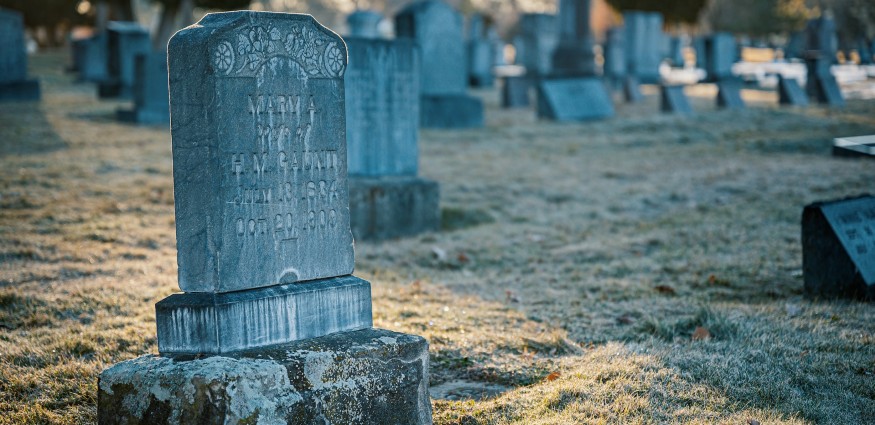In the latest piece of our Expert Comment series, Professor Micahael Brennan consider what lessons can be learnt from those celebrities who choose to document their death in the public.
In April, the BBC Storyville documentary, Deborah James: Bowelbabe in Her Words, was broadcast. Since reality television celebrity Jade Goody’s very public dying a decade earlier, James is the latest high profile instance of someone who has deliberately chosen to share their dying in the full glare of modern media.
The reasons for this may well be numerous, including a desire to leave a lasting legacy in ways that may be helpful to others. To this end, Deborah James’ campaign work around bowel cancer awareness has seen a spike in NHS screening for bowel cancer in ways similar to the so-called “Jade Goody effect” that saw an uptake in cervical screening among young women following Goody’s death.
Going public with news of one’s illness, diagnosis and dying is very much part of the Zeitgeist. It is part of a culture of sharing all manner of personal information that, in the past, was once hidden and closeted from public view. In the context of illness and dying, this reflects a necessary change in death mentalities and provides a much needed challenge to dying that was once shameful, stigmatised and often very lonely.
Dying in a New Media Ecology
The public dying of the kind I am talking about here is, in the overwhelming majority of cases, from cancer – a major cause of death in contemporary society that provides a prolonged or “lingering” dying that allows people to document and share their experience with others, often in writing, but also increasingly using a range of social media.
Videos, blogs and podcasts are now part of the technology by which people dying with cancer can share their experiences, reaching a global audience that is not limited in time or space. James, and others like her, have explained how sharing such experiences on social media provides an opportunity for “memory making” by which those left behind – especially the children of people who die before their time – might come to remember them.
Online sharing of this sort provides both possibilities as well as pitfalls. It helps open up the creation of compassionate communities of support from which the dying might draw comfort and support. At the same time, it provides opportunities for spiteful trolling of individuals who share their stories. Rachael Bland, for example, one of the co-hosts of the BBC podcast “You, Me and the Big C”, was rebuked by some for not “fighting her cancer hard enough” or for not using alternative remedies.
New Ways of Being in the Face of Death
The sharing of personal experiences by those who are dying might provide us with some valuable life lessons. These might include re-prioritising our goals, such as spending more time with those we love, knowing that our time together is limited.
Those who die publicly in this way often talk about the “bonus time” provided by the knowledge of a terminal diagnosis in ways that allow them to live out the remainder of their days to the fullest. This is far cry from the days when healthcare professionals worked – sometimes in collusion with a dying person’s family – to conceal knowledge of a terminal prognosis from patients for fear of the psychological distress such knowledge might cause to a person.
This also reflects a change in death mentalities in ways from which we can learn something valuable. “Death positivity” in this sense involves a re-framing of death in such a way so as to reaffirm life and living. Inviting others to join their journey is both a rejection of the victimhood that comes from designation of the term “cancer patient”, as well as a rejection of the assumption that those who are dying are condemned to a moribund existence.
One of things we learn from those who share their experiences of dying is that the simple, pleasurable human experiences of life, of, for example, enjoying food and sex, do not necessarily diminish in the face of death.
We learn also that the language and discourse around cancer is often inadequate and unhelpful. Many who share their stories publicly talk not of cancer as a “battle” but as a “journey”.
Crucially, this is a “journey” from which others can gain valuable insight. This might include the medical staff treating a patient, helping to close-up the experiential gap between healthcare provider and patient as service user. The use of first-person experiential knowledge of this kind forms what today is known increasingly as narrative medicine. Such publicly shared accounts of dying might also help to resolve the “experiential poverty” among large sections of the population with little or no experience of what bereavement or dying are like.
In a society in which people think we still do not talk about death and dying enough, such accounts may also provide opportunities for families, friends or people working in the wider caring professions to initiate difficult conversations with people nearing the end of life.
It may even be the case that what is imbibed from these accounts – of fortitude, resilience and positivity, among other things – can be deployed at a later stage when others themselves come to face the end of life.
This article was originally written and published for the British Sociological Association.



